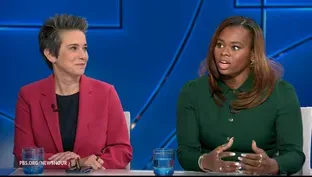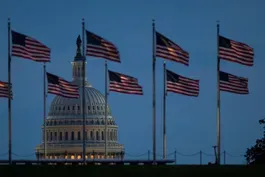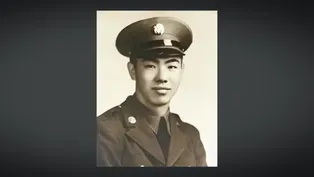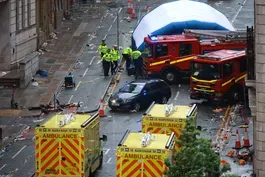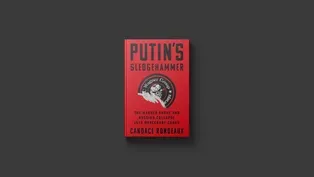
Russia escalates drone attacks on Ukraine
Clip: 5/26/2025 | 10m 2sVideo has Closed Captions
Russia escalates assault on Ukraine with massive drone attacks on cities
In the past week, 30 Ukrainians have died and more than 163 others injured as Russia escalated its bombing campaign amid U.S. efforts to end the war. It prompted President Trump to lash out at not only Russian President Putin, but also Ukrainian President Zelenskyy. Laura Barrón-López discussed more with retired Army Col. Robert Hamilton of the Foreign Policy Research Institute's Eurasia Program.
Problems with Closed Captions? Closed Captioning Feedback
Problems with Closed Captions? Closed Captioning Feedback
Major corporate funding for the PBS News Hour is provided by BDO, BNSF, Consumer Cellular, American Cruise Lines, and Raymond James. Funding for the PBS NewsHour Weekend is provided by...

Russia escalates drone attacks on Ukraine
Clip: 5/26/2025 | 10m 2sVideo has Closed Captions
In the past week, 30 Ukrainians have died and more than 163 others injured as Russia escalated its bombing campaign amid U.S. efforts to end the war. It prompted President Trump to lash out at not only Russian President Putin, but also Ukrainian President Zelenskyy. Laura Barrón-López discussed more with retired Army Col. Robert Hamilton of the Foreign Policy Research Institute's Eurasia Program.
Problems with Closed Captions? Closed Captioning Feedback
How to Watch PBS News Hour
PBS News Hour is available to stream on pbs.org and the free PBS App, available on iPhone, Apple TV, Android TV, Android smartphones, Amazon Fire TV, Amazon Fire Tablet, Roku, Samsung Smart TV, and Vizio.
Providing Support for PBS.org
Learn Moreabout PBS online sponsorshipLAURA BARRON-LOPEZ: Welcome to the "News Hour."
Russia is escalating its bombing campaign against Ukraine with a massive drone attack hitting cities and towns overnight and into this morning.
In the past week alone, 30 Ukrainians have been killed and more than 163 injured.
That's prompted President Trump to lash out at Russian President Vladimir Putin, but also Ukrainian President Volodymyr Zelenskyy, as diplomacy stalls and violence rages.
A late night for Ukraine, as flames and sirens broke through the darkness.
Overnight, Russia sent the biggest drone attack of the entire war so far.
Ukrainian Air Force officials say more than 355 drones came from Russia last night and the night before 298 drones, plus almost 69 missiles.
Today, Ukrainian President Volodymyr Zelenskyy said the attacks made it clear Russian President Vladimir Putin didn't want to end the war.
VOLODYMYR ZELENSKYY, Ukrainian President (through translator): All the more so as Russian strikes are becoming increasingly brazen, over 900 attack drones launched against Ukraine in just three days, along with ballistic and cruise missiles.
LAURA BARRON-LOPEZ: On Sunday outside of Kyiv, Ivan and Liubov Fedorenko's home was destroyed.
LIUBOV FEDORENKO, Kyiv, Ukraine, Resident (through translator): Thank God we had no children at home.
Yesterday, I was trying to persuade my daughter to come to us.
After, all she lives on the eighth floor in Kyiv and here it's the ground floor.
She said: "No, Mom, I'm not coming."
And thank God she didn't come because the rocket hit on the side where the children's rooms were.
LAURA BARRON-LOPEZ: Moscow's Defense Ministry says they have shot down more than 100 Ukrainian drones.
And flights to Moscow were diverted on Sunday and Monday.
On the tarmac yesterday, President Trump said he was losing patience with Russian President Putin.
DONALD TRUMP, President of the United States: I don't know what the hell happened to Putin.
I have known him a long time.
Always gotten along with him, but he's sending rockets into cities and killing people.
And I don't like it at all, OK?
We're in the middle of talking and he's shooting rockets into Kyiv and other cities.
I don't like it at all.
LAURA BARRON-LOPEZ: But the president dodged questions about what changes he's willing to make, such as sanctions on Russia or military assistance to Ukraine.
QUESTION: Mr. President, what do you want to do about that?
DONALD TRUMP: And I'm not surprised.
I'm very surprised.
We will see what we're going to do.
What, am I going to tell you?
You're the fake news aren't you?
You're totally fake.
LAURA BARRON-LOPEZ: Later, on social media, the president posted that Putin "has gone absolutely crazy" and had harsh words for Ukraine's President Zelenskyy, writing: "Everything out of his mouth causes problems.
I don't like it and it better stop."
Kremlin spokesman Dmitry Peskov claimed Russia was retaliating against Ukrainian strikes and called President Trump's words an emotional reaction.
DONALD TRUMP: I will prevent World War III.
LAURA BARRON-LOPEZ: From the early days of the presidential campaign, Trump said he alone could end the violence on day one.
DONALD TRUMP: Before I even arrive at the Oval Office shortly after we win the presidency, we win, all of us together are going to win, I will have the horrible war between Russia and Ukraine settled.
I know them both.
I will get it settled.
(CHEERING) LAURA BARRON-LOPEZ: But, four months later, progress is elusive.
President Trump and Putin spoke on the phone just last week and Trump said cease-fire talks were imminent.
Russian and Ukrainian officials recently met in Turkey for their first in-person talk since 2022.
And Trump has sent high-level officials to speak to Putin like envoy Steve Witkoff.
Many Republicans in Congress have been advocates for Ukraine, but have largely deferred to Trump.
Now cracks are appearing in that united front.
Iowa Senator Chuck Grassley made a direct plea on social media, asking the president to take action, at least sanctions.
For perspective on the latest Russian attacks against Ukraine, we turn to retired Army Colonel Robert Hamilton.
He spent much of his career focused on the former Soviet Union and is now head of research for the Foreign Policy Research Institute's Eurasia Program.
Colonel Hamilton, thank you so much for joining the "News Hour."
COL. ROBERT HAMILTON (RET.
), Foreign Policy Research Institute: Thank you for the invitation.
Glad to be with you.
LAURA BARRON-LOPEZ: So, President Trump talked to Russian President Putin about a week ago, and yet there's been this steady increase in Russian drone attacks on Ukraine.
Why is this happening?
COL. ROBERT HAMILTON (RET.
): So I think there's two reasons, Laura.
I think part of it is negotiating behavior, right?
I think the Russians understand, after the face-to-face meeting with the Ukrainian delegation in Turkey and also after the Trump-Putin call, that negotiations are likely, that they are likely to be pressured into direct negotiations to include the U.S., so that would be U.S.-Russia-Ukraine.
And part of this is negotiating behavior.
It's sort of establishing a position, staking out a position in advance of negotiations, by raising the level of military activity in Ukraine.
And part of it, I think, is, frankly, to deflect from the fact that the ground war is not going as well for Russia as I think a lot of the narrative in international and particularly Western media would have us believe.
Since November of last year, Russian territorial gains in Ukraine have declined month on month pretty significantly and pretty steadily, and their casualties per square kilometer gained have risen pretty significantly.
LAURA BARRON-LOPEZ: As Russia is escalating its attacks, President Trump said this weekend that he thinks Putin has gone -- quote -- "crazy" and that he doesn't like the attacks, but he also said that he has gotten along with President Putin in the past.
Do these comments have any effect on Putin whatsoever?
COL. ROBERT HAMILTON (RET.
): I think maybe at the margins, right?
I think Putin is walking a fairly thin line.
So he wants to delay negotiations as long as possible, because I think Putin believes he can outlast the West and, without Western support, Ukraine will not be able to win the war.
It's likely that that's correct.
Ukraine won't be able to win the war without Western support, but the cutoff in Western support and especially U.S. support does not necessarily mean Ukraine will lose the war.
So, on the one hand, this is Putin trying to kick the can down the road, essentially, extend the timeline until negotiations start.
But, on the other, again, this is negotiating behavior.
LAURA BARRON-LOPEZ: Meanwhile, Germany's new chancellor said today that his country and other major allies are no longer imposing any range restrictions on weapons supplied to Ukraine as it fights Russia's invasion.
And in the past, U.S. had placed restrictions on how far into Russia Ukraine could fire U.S. made missiles.
And U.S. and the allies in the past have followed those restrictions.
How big of a deal is this possible change?
COL. ROBERT HAMILTON (RET.
): So I think it would be a really big deal if two conditions hold.
One, if -- Germany has been very tight-lipped, at least the Merz government has been very tight-lipped about whether it has or will supply Taurus cruise missiles to Ukraine.
If it does, the Taurus has a range of 500 kilometers.
It's a very long range.
It's longer, for instance, than U.S. ATACMS, which is a ground-launched missile.
And so if Germany supplies Taurus missiles to Ukraine, and if Germany, the U.K., France, and the U.S., and U.S. is critical here, if they all, in conjunction with each other, lift the restrictions on Ukraine's using those weapons to strike deep into Russia, then it's very significant.
The reason I say the U.S. is critical is, my understanding is that U.S. support is critical for the guidance systems of even non-U.S. missiles.
In other words, without U.S. support and acquiescence, even the SCALP Storm Shadow and potentially the Taurus missiles will not be as accurate and effective as they would be if the U.S. provided the support for the guidance systems.
LAURA BARRON-LOPEZ: In the past week, there's also been increased talk of sanctions, including from Europe.
What are they considering and are they serious about potential sanctions on Russia?
COL. ROBERT HAMILTON (RET.
): So, a new European round of sanctions, my understanding, has been approved.
I'm not sure if it's been applied yet, but the E.U.
has approved a new round of sanctions on Russia.
These are essentially a moderate escalation of the sanctions that are already in place.
I think the critical thing, and the main reason or the main means by which Russia is still able to make money and support its economy throughout this war, is by the shadow fleet, the fleet of oil tackers that are unregistered and uninsured.
But the shadow fleet is able to deliver Russian oil.
Some of our partners and allies, particularly in the Baltics, have seized some of these Russian tankers, these shadow fleet tankers over the last month or two.
If Ukraine's partners get serious about interdicting or even removing the shadow fleet altogether, then that would have a serious effect.
LAURA BARRON-LOPEZ: Here in the U.S., Republican leadership in Congress is also threatening sanctions of their own with a bipartisan bill that would, in addition to sanctions, put a 500 percent tariff on goods imported from countries that buy Russian oil.
Do you think Congress should move forward with these sanctions or that they have to wait to get signal of approval from President Trump?
COL. ROBERT HAMILTON (RET.
): No, Congress can absolutely move forward with sanctions on its own.
It did that in the first Trump administration.
In the first Trump administration, Congress passed sanctions on Russia explicitly for the reason that essentially they didn't trust the White House to keep sanctions in place.
And so Congress passed sanctions that then only Congress can remove.
And that could happen this time as well.
And I think it would be a positive step if it did.
LAURA BARRON-LOPEZ: That's Colonel Robert Hamilton of the Foreign Policy Research Institute.
Thank you for your time.
COL. ROBERT HAMILTON (RET.
): Thank you.
Amy Walter and Jasmine Wright on Trump's big bill
Video has Closed Captions
Clip: 5/26/2025 | 11m 12s | Amy Walter and Jasmine Wright on how Senate Republicans feel about Trump's big bill (11m 12s)
Catholic Relief Services faces uncertain future after cuts
Video has Closed Captions
Clip: 5/26/2025 | 6m 45s | Catholic Relief Services faces uncertain future after Trump cuts aid funding (6m 45s)
How young Democrats are pushing to redefine the party
Video has Closed Captions
Clip: 5/26/2025 | 3m 20s | How young Democratic candidates are pushing to redefine the party's future (3m 20s)
Japanese American WWII vet built bridges between cultures
Video has Closed Captions
Clip: 5/26/2025 | 8m 50s | Japanese American veteran built bridges between cultures after WWII (8m 50s)
News Wrap: Driver plows into crowd of people in Liverpool
Video has Closed Captions
Clip: 5/26/2025 | 6m 39s | News Wrap: Driver plows into crowd of fans celebrating Liverpool FC championship (6m 39s)
'Putin's Sledgehammer' reveals how Wagner Group gained power
Video has Closed Captions
Clip: 5/26/2025 | 9m 19s | 'Putin's Sledgehammer' reveals how the Wagner Group became so powerful it threatened him (9m 19s)
Providing Support for PBS.org
Learn Moreabout PBS online sponsorshipSupport for PBS provided by:
Major corporate funding for the PBS News Hour is provided by BDO, BNSF, Consumer Cellular, American Cruise Lines, and Raymond James. Funding for the PBS NewsHour Weekend is provided by...
